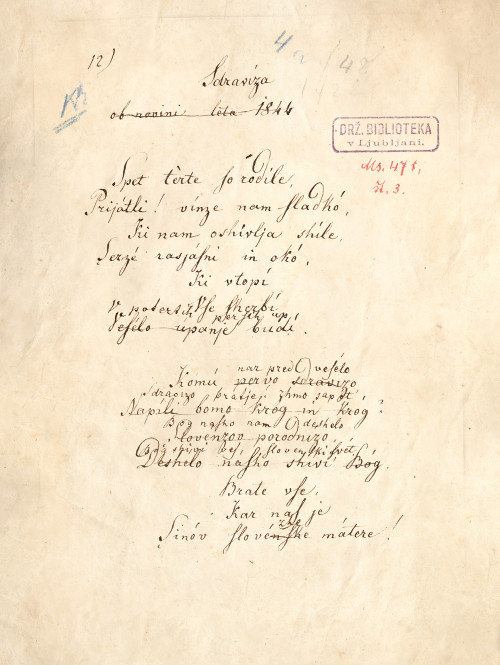France Prešeren and Slovenian Romantik
Many contemporaries considered France Prešeren to be a prophet: From his verses they extracted deeper meanings, which they applied to current reality and history. His ideas about creative work and the poet's destiny took particularly firm roots among Slovenes.
Prešeren's sixth ghasele deals with the uncertainty about the success of any endeavor: despite good intentions or even perfection, the result may be rejected by other people - even by those for whom it is expressly intended. However, this must not deter the creator from his mission. In his poetry, Prešeren did not move away from this search for perfection: The texts published in the poetry volume Poezije (Poetries) after final editing deviate significantly from the original versions.
The glosa (gloss), which appeared in 1834, draws attention to Prešeren's high aspirations for literature. At the same time, it is also about the incomprehension towards creative peaks of literature and the defiant insistence of poets and writers on their own mission. Prešeren's idea of the artist is romantic: he is one - masterless - against all.
The poem Pevcu (To the Poet), originally titled Osrčenje (Encouragement), was published in 1838. The text is extremely thoughtful and symmetrically arranged, and the number of verses corresponds to that of a classical sonnet. In Prešeren's work, this poem is the link between his previous poetry in canonized forms and his later, more individualized poems. Likewise, the insight into the poet's tragic fate associated with inadequate reception gradually gave way to justification in an existence torn between extremes. The poet's life differs from the fate of others in the intensity or radicality of his insights and experiences. The contrast between him and others is thus in reality only a consequence of different depths in the understanding of the world.
The poem Zdravljica (Toast), written in 1844, could be published only after the March Revolution. It was intended as Prešeren's personal and also political message to the world and is both a critique of reality and, in the case of the domination of good people, a program for the future. And even if the opposing forces should celebrate the victory, Zdravljica shows a utopia that is still worth living for.
